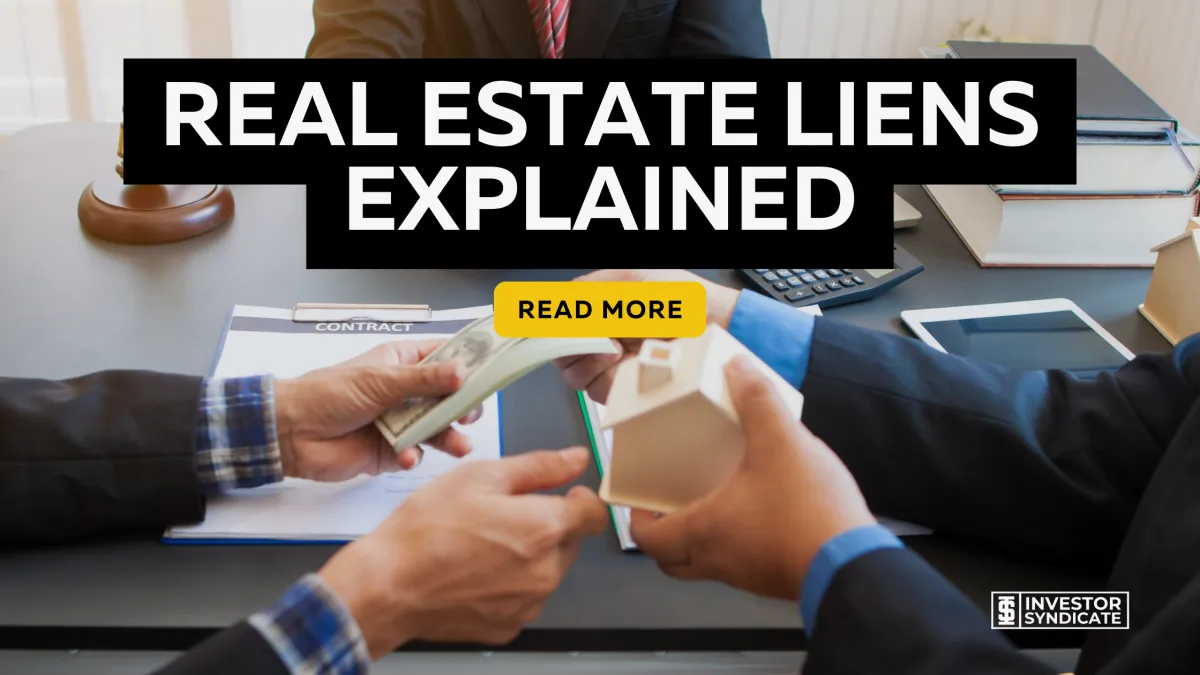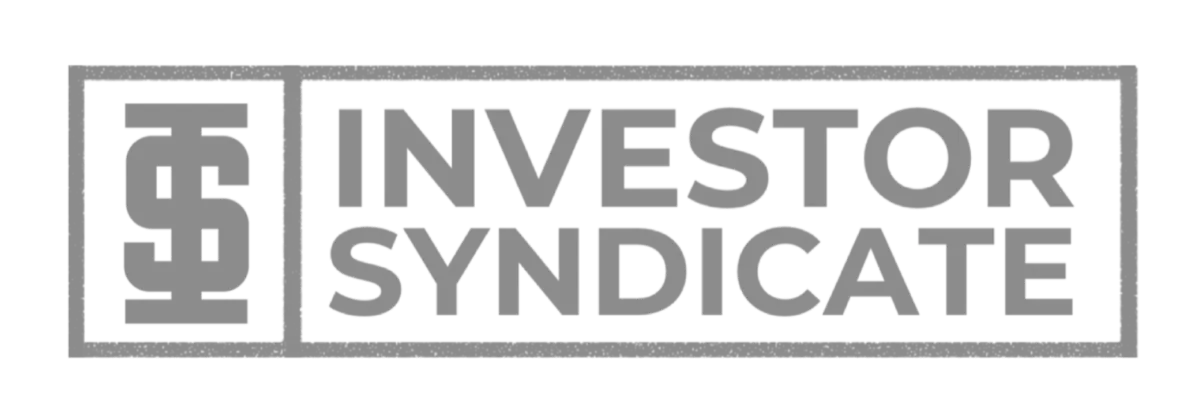Investor Syndicate Blogs
Download The Deal Flipping Playbook

The Real Estate Liens Explained
Introduction
Real estate liens are a critical aspect of property law and an essential concept for homeowners, real estate investors, and professionals in the real estate industry to understand. This article aims to demystify real estate liens, explaining what they are, how they work, the different types, and their implications for property owners and buyers.

What are Real Estate Liens?
A real estate lien represents a significant legal claim imposed on a property, serving as a security measure for creditors to ensure the repayment of debts. This lien is a formal record that attaches to the property's title, signifying that a debt is linked to the value of the property. It is a crucial tool in the financial and real estate sectors, ensuring that creditors have a method of recourse if a debtor fails to fulfill their financial obligations.
In the event that the property owner is unable to satisfy the debt or obligation associated with the lien, the lien holder, often a financial institution, contractor, or government entity, is legally empowered to implement measures to recover the owed amount. This may include initiating foreclosure proceedings or compelling the sale of the property.
The lien must be settled or paid off in full before the property can be sold or refinanced, making it a critical factor in real estate transactions. It acts as a safeguard for creditors, yet it also imposes a significant responsibility on property owners to manage their debts effectively to avoid legal complications or the potential loss of their property.
Types of Real Estate Liens
Mortgage Liens: This is the most common type of lien, placed on a property when a mortgage is taken out. The lender has a lien on the property until the mortgage is fully paid off.
Tax Liens: Imposed by government entities for unpaid taxes. They can be for property taxes, income taxes, or other tax obligations.
Mechanic's Liens: These are placed by contractors or suppliers who have not been paid for work done on a property.
Judgment Liens: Arising from a court judgment, these liens are attached to a debtor's property as a way to satisfy the judgment.
How Liens are Created
Consensual liens arise when a property owner willingly agrees to a lien, typically as part of a financial transaction. A common example of this is a mortgage lien, where the property owner consents to the lien on their property as security for a mortgage loan. This type of lien is a standard and expected part of obtaining a mortgage, where the lender retains a legal interest in the property until the loan is fully repaid.
On the other hand, non-consensual liens are imposed without the property owner’s explicit agreement, often as a legal consequence for unmet obligations. These include tax liens, placed by governmental authorities for unpaid taxes, and judgment liens, which result from a court ruling against a property owner who has failed to settle a debt or legal judgment.
Unlike consensual liens, these are typically unforeseen and can create significant complications for property owners, potentially leading to enforced sale or foreclosure if the debts remain unpaid. Understanding the nature and implications of both types of liens is crucial for property owners and prospective buyers to navigate the complexities of property ownership and financial responsibilities.
Priority of Liens
The concept of lien priority is a fundamental aspect of property law, playing a pivotal role in the realm of real estate and finance. Essentially, the priority of a lien determines the order in which claims against a property will be satisfied, particularly in the event of a foreclosure sale.
Generally, this priority is established based on the chronological order in which the liens are recorded against the property, with the first recorded lien typically having the highest priority. However, there are notable exceptions to this rule, the most significant being property tax liens. These liens, imposed by government entities for unpaid property taxes, are typically granted a superior priority status. This means that, irrespective of when they are placed, property tax liens are usually positioned at the forefront for repayment, superseding earlier recorded liens.
This hierarchy is crucial for potential buyers and investors to understand, as it significantly influences the financial and legal implications of acquiring or holding property with existing liens. The intricate interplay of lien priorities underscores the need for meticulous scrutiny and legal acumen in real estate transactions, ensuring that all parties are adequately protected and informed.
The Impact of Liens on Property Owners
For property owners, the presence of liens on their property can represent a considerable encumbrance, carrying with it a range of financial and legal implications. Liens, essentially being claims against a property for unpaid debts, can significantly hinder an owner's ability to transact freely with their property.
One of the primary challenges posed by liens is the obstruction they create in the sale or refinancing of the property. In such scenarios, the existence of any lien necessitates its clearance before a clear title can be transferred to a new owner or before any refinancing deal can be finalized. This requirement often means that property owners must first settle these debts, which can be financially straining.
Furthermore, the implications of unsatisfied liens are even more severe. If a lien is left unsettled, the lienholder is endowed with the legal authority to initiate a foreclosure sale. Such an action is not only detrimental to the property owner’s financial standing but also results in the loss of their property. Therefore, managing and addressing liens is a critical aspect of property ownership, demanding vigilant attention to avoid severe consequences.
How to Find Out if a Property has a Lien
Conducting a thorough title search before acquiring property is an indispensable step in the real estate purchasing process. This critical investigation serves to reveal any existing liens or encumbrances that might be attached to the property.
Engaging the services of a reputable title company is a common and effective approach for this purpose. These companies specialize in examining public records and other legal documents to trace the history of the property, ensuring that the title is clear of any hidden legal claims or obligations. Alternatively, a prospective buyer can personally delve into public records, although this can be more challenging and time-consuming.
The importance of a title search cannot be overstated, as it safeguards a buyer from potential legal and financial complications. Liens, such as those from unpaid taxes, contractors, or mortgage lenders, can significantly impact the legal ownership and financial value of the property.
Identifying these issues beforehand enables a buyer to make an informed decision, negotiate better terms, or even reconsider the purchase if necessary. Overall, a title search is a fundamental due diligence measure that provides peace of mind and legal protection in property transactions.
Removing a Lien from a Property
The most direct and efficient method for eliminating a lien from a property's title is through the complete repayment of the associated debt. When a debtor fulfills their financial obligation, the responsibility then shifts to the lienholder, who is required to issue a formal document known as a 'release of lien.' This document serves as a legal testament that the debt has been fully satisfied and that the lienholder relinquishes any further claim on the property.
To ensure the removal of the lien from public records and to clear the property title, this release must be properly filed with the county recorder’s office. This step is crucial; without this official recording, the lien may still appear in public records and potentially impact future transactions involving the property.
The process underscores the necessity for both parties to adhere to legal protocols, ensuring that property titles remain clear and transferable. It's a system designed to protect the interests of all parties involved, providing a clear path to resolving financial encumbrances on properties.
Buying a Property with a Lien
Purchasing a property with a lien can be risky. It's essential to understand the type and amount of the lien, and whether it's a primary or secondary lien. Often, liens must be satisfied at closing, which can impact the amount of financing needed.
Liens and Foreclosure
If a lien is not paid, the lienholder may initiate foreclosure proceedings to recover the owed amount. This process varies depending on the type of lien and state laws.
Special Considerations for Real Estate Investors
Real estate investors must be particularly vigilant about liens, as they can affect the return on investment. Investors should always conduct thorough due diligence to identify any liens that may be attached to a property.
Conclusion
Real estate liens play a significant role in property transactions and ownership. Understanding the types of liens, how they are created, their impact, and how to deal with them is crucial for anyone involved in real estate. Proper management and resolution of liens ensure clear property titles and smoother transactions.
FAQS Frequently Asked Questions
Can a property be sold with a lien on it?
Yes, but the liens typically must be paid off at closing.
Do all liens have the same legal standing?
No, liens have different priorities, with some (like tax liens) typically having higher priority over others.
How long does a lien stay on a property?
It varies depending on the type of lien and state laws, but some liens remain until they are paid off or expire.
Can a lien affect your credit score?
Yes, certain liens, like judgment liens, can negatively impact your credit score.
Is it possible to dispute a lien?
Yes, if you believe a lien has been wrongly placed on your property, legal avenues are available to dispute it.
Contact Us

Bet On Yourself
Empowering real estate investors with the tools they need to scale.






